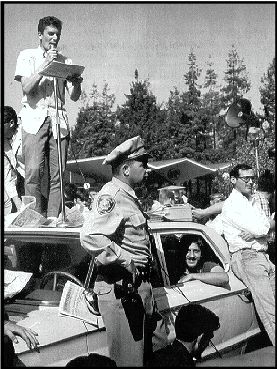Vincent
(Tuong Le)
ASA002-A02
Week
2 Response to “Berkeley Free Speech Movement: Paving the Way for
Campus Activism”
The
article's description of the 1964 Berkeley Free Speech movement shows
the incredible power and potential of solidarity among students and
faculty. What surprised me the most about the article was how large
the protests came to be. With thousands of students boycotting
classes and attending meetings, it seems to be larger than most
protests that I've witnessed personally. This was especially true
when I read about the arrest of Jack Weinberg: the hundred or so
students that initially surrounded the police car grew to a mass of
several thousand. I believe that this level of confidence in the face
of authority is what is needed in order to allow contemporary student
movements to succeed. I am afraid of a culture that resembles the
“silent generation” of McCarthyism discussed in the article,
which is how I feel things appear at times in contemporary culture.
People are too afraid to be themselves negatively affected to stand
in solidarity with those who are willing to put themselves at risk,
but by doing this, they keep the system of power and
oppression in place, and also keeping the other protesters weak and small. Because the
protest is not supplemented by numbers and unity, it becomes easily
crushed and forgotten. That is a fate I would want to avoid for the
protests of today.
Questions:
Is solidarity enough to help a protest succeed?
Is
the idea of power in numbers a valid one for student protests?
What
should a protest do if it realizes that there are not enough people
who care?
How
many people feign apathy in order to put themselves out of risk, even
though they truly care about the problem?
An image of a protester speaking atop of the police car mentioned in the article.

No comments:
Post a Comment